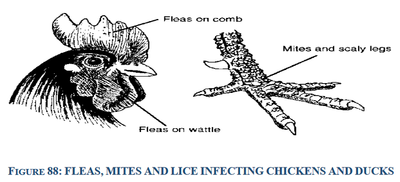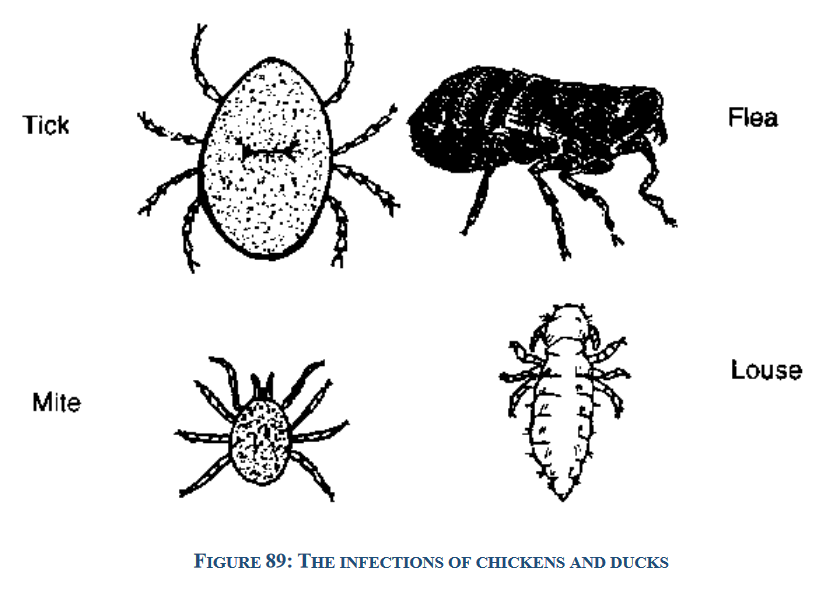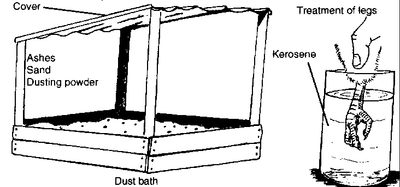External Parasites of Chickens and Ducks
External Parasites of Chickens and Ducks
Introduction
A number of lice and mites infect birds and cause severe irritation which leads to loss of feathers, loss of weight and low numbers of eggs. Small ticks feed on the blood of birds and can carry germs which will cause other diseases. External parasites will hide in the walls, floors and bedding of the cages and houses where birds are kept. In order to control the parasites, it is necessary to keep these places clean and kill any parasites there.
Fleas, Mites and Lice infecting chickens and ducks
Fleas
Fleas are small and dark in color and can jump high into the air. They feed on blood and can live without food for a long time. The eggs and young of fleas are found in the birds' nests and cracks in walls and floors of buildings. One type of flea is found on the wattles and comb of chickens and does not jump away. Its bite causes ulcers to form and large numbers can kill young birds. It also infects ducks and is found around the eyes. They can bite people.
Mites
A number of different mites infect birds and cause irritation and loss of feathers. The scaly leg mite can cause lameness. Red mites can kill birds and will also bite people.

Lice
Chickens can be infected with a number of lice which suck blood and chew the skin. Ducks can also suffer from infections with lice. The parasites can attack all areas of the body and are found on the skin and feathers.Lice infections cause irritation and prevent birds from resting, sleeping and eating properly. The birds lose weight and egg production drops. Loss of feathers can occur in chickens.In ducks infection with lice can damage feathers so that the birds die from cold.
Ticks infections of chickens and ducks

Both chickens and ducks can be attacked by the small, blue or brownish fowl tick. They live in cracks in walls or trees and can live for several years without feeding on the blood of a bird. The tick feeds at night and can cause egg laying to stop. It causes tick paralysis in ducks and spreads other infections.
How to treat infected birds
To control external parasites birds must be treated with a powder or spray containing, e.g. trichlorphon or malathion. The cages and houses must be thoroughly cleaned. Chickens will clean their feathers daily with soil or sand (a dust bath). A shallow box containing sand and ashes (left from a fire) will be used by birds and helps to keep the feathers clean and free of infections. A light dusting of a dusting powder will make the dust bath better.

Scaly leg of chickens can be treated by dipping the leg in paraffin (kerosene) and then gently brushing the leg. Paraffin must not be allowed to touch the skin or feathers.
Cleaning cages and houses
If birds are infected with external parasites it will be necessary to thoroughly clean out cages and houses. All bedding and dirt must be removed and all parts of the equipment should be thoroughly scrubbed with soap and hot water. If possible you should then spray or paint the equipment with a mixture of paraffin and creosote in equal amounts or with nicotine sulphate (40%). Your veterinary service will advise you on what is available locally for you to use.
You can use a hand pump to spray houses. You can spray with a treatment for external parasites and your veterinary officer can advise you on this.
Source : Pashu Sakhi Handbook
Last Modified : 7/1/2021
This topic provides information about 20th Livesto...
This topic provides information about Sim Card Swa...
This topic deals with information related to Appen...
This topic deals with information related to Anxie...
